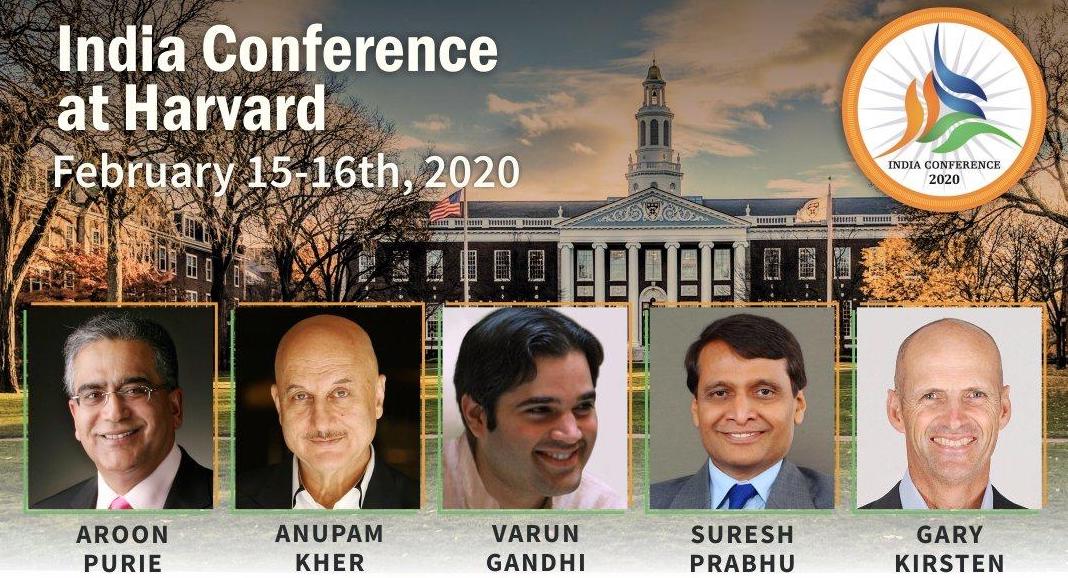A former Minister of State, a well-recognized journalist, and a political scientist with a large Twitter following walk into a bar. They’ve just finished speaking at the Harvard India Conference and now sip whiskey and laugh boisterously at the Charles Hotel. The student organisers who invited them to discuss India’s pressing public issues have raised funds for this exclusive gala networking dinner, costing upwards of $30,000.
This may sound like a joke, but it’s not. As one of the co-organizers of the Harvard India Conference 2020, I was deeply uncomfortable with the cost of the dinner, and the priority on networking over public discussion.
Set up as a series of panel discussions and keynote addresses over two days, the conference has been entirely student run for the last seventeen years. It is attended by almost 1000 people, mostly Indians and diaspora in the Greater Boston area, enticed by celebrity speakers on topics ranging from education to health, Bollywood to cricket. Speakers are drawn from the professional and personal networks of the organizing students based on their particular interests. These networks are substantial: Indian students at Harvard are typically from privileged backgrounds (i.e. city bred, highly educated, English speaking, and upper caste). The funds that are raised are spent on operational expenses that include the costly networking dinner. Speakers come at their own cost with no support provided for their travel.
The result – the only people having the discussion on public policy issues are the ones who can afford to. That’s a problem.
Student organizers and invited speakers can be well-intentioned, but they can also be self-serving. One hopes that the conference is relevant to public policy in India, yet the traction it receives is more likely to be the result of the savviness of the speakers’ public relations than due to any substantive discussion. The conference enables the speakers to elevate their social capital on a misleading premise. These are not the best possible people invited by a prestigious university to have a discussion. They are instead those who are part of a particular network with financial resources.
It is an embrace of elitism.
Public space and discussion are intrinsic elements of public policy. No public policy discussion can be relevant without the people who are most affected by them. Giving space to only already powerful voices and making minimal effort to amplify others is actively detrimental to public issues, and poor practice for future leaders working on public policy. The Harvard India Conference needs to do better to demonstrate how to have inclusive and representative policy discussions.
A tighter synthesis and prioritizing of topics across student interests would be a good place to start. We should put more thought into “who is missing” from the conversation. The lack of diversity is embarrassing. For the 2020 conference, only one in three panelists at HKS were women, and one in five at HBS. Of the eleven opening and closing speakers on both days, ten were upper caste Hindus. Future organizers could bring in speakers who otherwise cannot afford to come by cutting down the size of the conference and building collaborations with existing centers at the university to bring in additional financial resources. Creating institutional memory to absorb feedback and learning from previous years is also needed. Inexplicably, the website changes every year with no archive of past speakers and sessions or disclosure of budgets.
This is not to take away from the merit of the people involved and the several constructive discussions that happen despite this format. It is also not to take away from the volunteer effort of the organizers and the often-great lengths they go to in order to overcome these barriers by raising resources for specific speakers to bring in diversity. However, if the prestige of Harvard is being used, let it also be earned.
Facilitating genuine public discussion is difficult work. We have few models to look towards – prime-time television ranges from a polarized binary to propaganda and our parliament passes legislation with minimum discussion. In offices and public transport chatter, people self-censor instead of expressing views critical of the government for fear of being threatened.
This makes the import of convening public discussion all the more relevant. Getting it right takes patience and practice. Let’s take advantage of being in a learning environment like HKS, to experiment on how to have these essential discussions properly. By revising its format to facilitate diversity in speakers, cohesion in topics and enabling critical perspectives, we can hold ourselves to a higher standard worthy of emulation.
The Citizen is the independent, official newspaper of the Harvard Kennedy School. Sign up for our mailing list here so you never miss an article.
Our mission is to seek the full truth on university and community affairs. In doing so, we challenge assumptions and spark meaningful dialogue on the identity and ideals of HKS. We strive to help the school achieve its own goal: allow people to leave safer, freer, and more prosperous lives.
If you are interested in contributing to The Citizen, send us an email at the_citizen@hks.harvard.edu.
